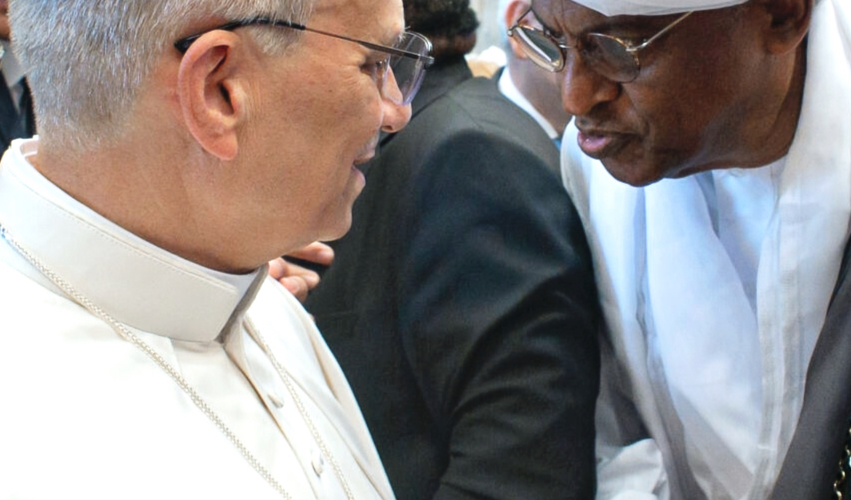UPF Addresses Parliamentary Interfaith Conference in Rome
- Jun 21, 2025
- 4 min read
Updated: Jul 31, 2025
Rome, Italy – At the seat of the Italian Chamber of Deputies in Rome’s Palazzo Montecitorio, the Second Parliamentary Conference on Interfaith Dialogue was held from June 19-21, 2025, on the theme, “Strengthening trust and embracing hope for our common future.” The conference was organized by the Inter-Parliamentary Union (IPU) in partnership with the Italian Chamber of Deputies, the Italian Senate, and the NGO Religions for Peace.
The conference was attended by 650 delegates from nearly 100 nations, including parliamentarians from 68 IPU member nations and from two associate member organizations (the Arab Parliament and the EU Parliament), as well as representatives from ten permanent observer organizations (such as the United Nations and UNESCO), from 19 academic organizations and over 70 NGOs, faith-based organizations and intergovernmental organizations, as well as 26 religious leaders.
The Rome conference followed the first Parliamentary Conference on Interfaith Dialogue organized in 2023 in Marrakesh by the IPU and the Kingdom of Morocco. Held during the Jubilee Year designated by the late Pope Francis at the beginning of 2025, this second conference carried the spirit of the Marrakesh Communiqué, which affirmed that interfaith dialogue is “grounded in support of fundamental rights and freedoms” and “essential in promoting inclusivity and peaceful coexistence.”
General debate on the theme “Parliamentarians in dialogue with religion and belief: Strengthening trust and embracing hope for our common future” was held in the Assembly’s Plenary Hall, co-moderated by Senator Pier Ferdinando Casini and IPU President Dr. Tulia Ackson from Tanzania. After opening remarks by high-level representatives including Amb. Simona-Mirela Miculescu, president of the UNESCO General Conference and Mr. Miguel Moratinos, high representative of the UN Alliance of Civilizations, over 70 members of parliament, religious leaders, and NGO or faith-based organization representatives took the floor, giving short reports on their countries’ religious freedom policies or their organizations’ projects.
During the high-level session Dr. Tageldin Hamad, president of UPF-International, said, “True peace cannot be imposed from above or demanded from below – it must be cultivated through trust and rooted in our common spiritual and moral values.” He added, “The Universal Peace Federation believes that true peace cannot be achieved through politics alone, nor through religion in isolation. Lasting peace emerges when political wisdom and spiritual insight walk hand in hand.”
He added, “In this spirit, we recall the visionary proposal of Dr. Hak Ja Han and her late husband, Dr. Moon, the co-founders of UPF. On August 18, 2000 they organized an international conference at the United Nations headquarters in New York, and called for the establishment of an Interfaith Council at the United Nations. They believed that, alongside the voices of political leaders, the voices of spiritual leaders must also be heard, offering moral clarity, spiritual wisdom, and a deeper perspective on the human condition. Several nations heard the call and a productive process emerged, that led to positive results.”
Throughout the two-day conference, several working sessions were organized in adjacent halls. The themes included promoting peaceful coexistence; upholding the rights of religious minorities; advancing inclusive societies; promoting ethical leadership; investing in education for peace; interfaith dialogue and the inclusion of women in public life. Organizers and moderators included the IPU, Religions for Peace, the Abu Dhabi Peace Forum, the Network for Religious and Traditional Peacemakers, Globethics, the UN Alliance of Civilizations, and the Minority Rights Group.
In her closing remarks, Dr. Tulia Ackson, IPU president, emphasized the significance of the two-day conference. “We convened this conference,” she said, “because we see pain in the world, division in society, and our role as parliamentarians is to work towards a better world. Despite our differences and difficulties, we need to say yes to dialogue, or else we will lose the foundation of our humanity.”
Senator Casini read the “Rome Communiqué” to be adopted by the conference. The communiqué encourages all parliaments, among other actions, to strengthen provisions for freedom of religion or belief in law and practice; to counter hate speech and the weaponization of religion or belief; to counter digital threats to democracy and human dignity; to support peace education; and to consider organizing a dedicated session in parliament on interfaith dialogue with representatives of all religious communities.
Conference participants were invited to a special audience in the Vatican, where Pope Leo XIV addressed them, urging them to view political service as a noble form of charity rooted in truth, justice, and the common good. He highlighted the example of St. Thomas More, calling him a “martyr for freedom and for the primacy of conscience” for his unwavering commitment to truth, even unto death.
The Pope emphasized three key responsibilities for political leaders today: promoting the common good, especially defending the marginalized; safeguarding religious freedom through interfaith dialogue; and grounding decisions in natural law as a shared ethical foundation. He also addressed the growing challenge of artificial intelligence, warning that technological advancement must not compromise human dignity or freedom.
Pope Leo concluded by entrusting the work of legislators to the intercession of St. Thomas More, encouraging them to see politics not merely as a career, but as a mission in service of truth, justice, and the dignity of every person.





















